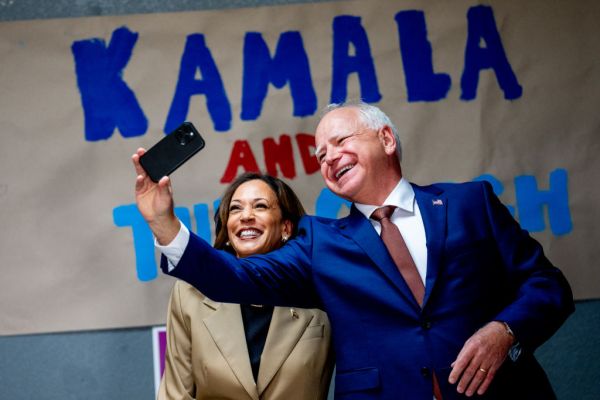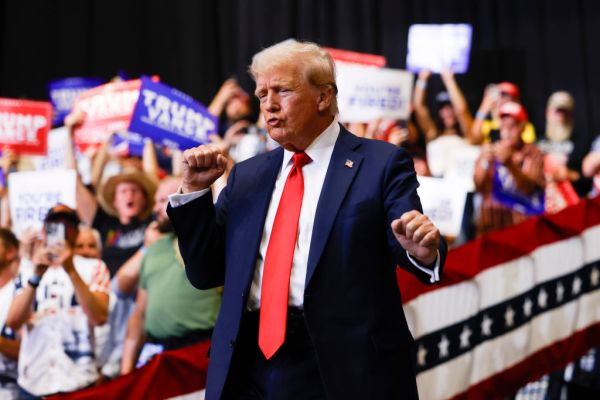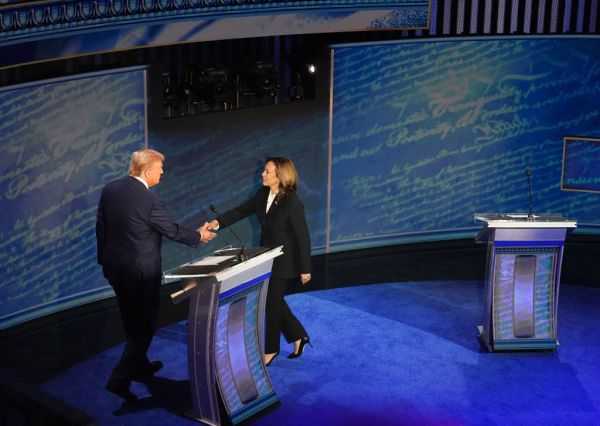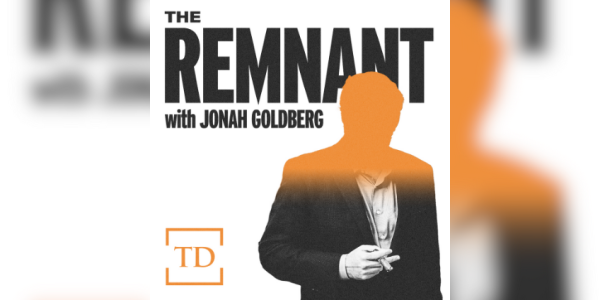Happy Friday! Send us your best recipes for “white guy tacos.” We’ll be eating Chicago-style pizza next week, but it’s good to have them in the cookbook.
Up to Speed
- Enthusiasm among Democratic and independent voters has shot up since Vice President Kamala Harris became her party’s presidential nominee, a Wednesday poll from Monmouth University found. The percentage of Democrats who said they were enthusiastic about the race between Harris and former President Donald Trump jumped from 46 percent in Monmouth’s June poll to 85 percent in Wednesday’s poll. Meanwhile, independent enthusiasm increased from 34 percent to 53 percent, and Republican enthusiasm remains unchanged. In addition, the number of “double haters,” voters who have an unfavorable view of both major-party candidates, declined from when Trump and President Joe Biden were running. Back in June, 17 percent of respondents described themselves that way; now, it sits at 8 percent. What’s more, 54 percent of double haters in June said they were not supporting either candidate, while 53 percent of such voters said they were supporting Harris in Wednesday’s poll.
- Vice presidential nominees Sen. J.D. Vance and Gov. Tim Walz this week accepted an invitation from CBS News to a debate on October 1 in New York. Network anchors Norah O’Donnell and Margaret Brennan will moderate. Vance also challenged Walz to a CNN debate on September 18, but the Harris-Walz campaign issued a statement indicating its ticket would participate in only two presidential debates and one vice presidential debate. “Assuming Donald Trump actually shows up on September 10 to debate Vice President Harris, then Governor Walz will see JD Vance on October 1 and the American people will have another opportunity to see the vice president and Donald Trump on the debate stage in October,” wrote communications director Michael Tyler, referencing an October presidential debate that is not yet confirmed. Trump last week recommitted to ABC’s September 10 debate and issued outstanding challenges to debate Harris on Fox News on September 4 and on NBC on September 25.
- Organizers expect 30,000 to 40,000 people dissatisfied with the Biden-Harris administration’s handling of Israel’s war in Gaza to join in Monday’s march on next week’s Democratic National Convention, Semafor reported Friday. Leaders of the coalition setting up the protest, made up of more than 150 pro-Palestinian, anti-war, and progressive groups, say it will be a “family friendly” demonstration. The city has given them a permit to stage the protest about a half-mile from the United Center, the convention’s main hall, but they are hoping to stage it closer to the perimeter.
- Democratic Sens. Jon Tester of Montana, Jacky Rosen of Nevada, and Sherrod Brown of Ohio will skip the convention, Axios reported Thursday. The decision of the three vulnerable incumbents represents an attempt to distance themselves from Harris and Walz. Tester and Brown are running in states Trump will most likely win, and Rosen is running in a battleground state.
- GOP Pennsylvania Senate candidate Dave McCormick released an ad Thursday attacking Harris and his opponent, Sen. Bob Casey, another vulnerable Democratic incumbent, for their promotion of the 2021 American Rescue Plan, which Republicans have blamed for the inflation plaguing Americans the past few years. The ad splices together clips of Harris and Casey insisting that the legislation would not add to inflationary pressures as the country emerged from the COVID-19 pandemic, coupled with more recent reports of inflation.
Trump’s Ground Game to Lean on Outside Groups

Donald Trump is following through with plans to abandon the voter turnout program that powered his underdog campaign to victory in 2016 and put the Republican nominee on the brink of reelection four years later, relying instead on a scaled-back operation and patchwork of outside groups.
Now, 80 days before Election Day, there is scant evidence of a Trump/RNC ground game, robust or otherwise, Republican operatives based in the key battleground states and GOP strategists involved in the party’s various get-out-the-vote efforts, told Dispatch Politics. “It’s confusing to me that the campaign would throw out the playbook that worked in 2016—and because the president said he won 2020, worked then, too,” said a Republican voter turnout strategist, who like most we interviewed, requested anonymity in order to speak candidly.
But James Blair, political director for the Trump campaign and the Republican National Committee, claims in a thread of X posts that “hundreds of paid staff” are deployed across battleground states, with more on the way—plus more than 12,000 “trained” volunteers, with plans to add more than 2,000 “per week” through Election Day. Karoline Leavitt, the former president’s campaign spokeswoman, added in a statement to Dispatch Politics late Thursday that there are more than “300 Trump/RNC [field] offices operating.”
Bolstered by a Federal Election Commission ruling issued in March that for the first time permits super PACs to coordinate with candidates on in-person voter canvassing, or door-knocking, the Trump campaign is leaning on well-funded outside groups to fill gaping holes in its ground game. For instance, in Pennsylvania, perhaps the most critical swing state, voter turnout is largely being handled by a consortium of Republican-aligned groups led by Sentinel Action Fund, a super PAC.
With four regional field offices in Pennsylvania, Sentinel Action Fund is focused on using door-knocking, text messages, digital appeals, and direct mail to push 1.2 million identified low-propensity GOP voters to the polls for the benefit of Republican Senate nominee Dave McCormick. Sentinel believes this activity will by its nature put voters in the booth who are highly likely to pull the lever for Trump and his running mate, Ohio Sen. J.D. Vance.
“Our entire mission is to get these low-propensity voters to vote early or join a permanent absentee voter list in Pennsylvania,” Jessica Anderson, the group’s president and a veteran of the conservative grassroots group, Heritage Action for America, said. Some Republican insiders endorse Trump’s decision to let super PACs shoulder the voter-turnout burden. Field operations are expensive and these groups can raise money in unlimited amounts. Campaigns are subject to strict federal limits on donations but pay significantly less for television advertising than outside groups.
The Trump campaign’s decision to let outside groups handle get-out-the-vote work coincides with the former president’s decision to prioritize investing heavily in ensuring ballot integrity and security, including poll watching and litigation. Put simply, the Republican nominee believes that protecting the votes cast will do more to help him defeat the Democratic nominee, Vice President Kamala Harris, than turning out the vote. Veteran Republican strategists insist Trump’s approach is flawed.
“The only thing team Trump is focused on is election integrity shifts. I was in Wisconsin last week talking to folks and they don’t see any door-to-door effort at all,” said a Republican operative with experience running field operations. “They bragged about filling 3,000 Election Day monitoring shifts. Great—but if you can’t push your people to the polls, who cares?”
A Republican strategist in Georgia, another crucial battleground, has observed voter turnout activities, whether conducted by outside groups or the combined Trump/RNC operation, coined “Trump Force 47” by the campaign. “But I don’t think anyone is doing digital, text, or an absentee ballot/early vote push, targeted to various populations,” this GOP insider said. “Everyone is using the term [voter turnout] without knowing what it actually entails.”
Dispatch Politics first reported in late April that the Trump campaign and the RNC were shifting resources from voter turnout to ballot integrity, at the direction of the former president. He continues to claim the 2020 election was stolen and has told multiple Republican strategists some version of what he said to Ronna McDaniel before he essentially replaced her as RNC chairwoman with Michael Whatley: “I’m not worried about turning out the vote, I just want to catch the cheaters.”
Two months later, Trump appeared on a glide path to winning his rematch with President Joe Biden and the efficacy of his ground game—or that of the Democratic nominee—was immaterial. Now, in a contest made newly competitive following Biden’s withdrawal and the ascension of Harris, voter turnout could conceivably swing the election. Harris, having inherited the muscular voter turnout program fielded by Biden and the Democratic National Committee (and having added to it), has a distinct advantage over Trump on this front.
Just in Michigan, Pennsylvania, and Wisconsin—the so-called “Blue Wall” states—the Harris campaign in an August 7 memorandum issued to reporters claimed “600 coordinated staff on the ground” and the pending addition of “another 150 staffers to these three states in the first two weeks of August.” In Wisconsin alone, the Harris campaign boasts 48 coordinated offices across 43 counties, including 32 in counties that Trump won in 2020,” plus 50 field offices in Michigan and, in Pennsylvania, “300 coordinated staffers across 36 offices.”
That’s not even counting what the vice president has deployed to get out the vote in Arizona, Georgia, Nevada, North Carolina, and elsewhere. Meanwhile, the most generous description offered regarding the state of the GOP ground game was that the Trump campaign is in the process of ramping up, and could prove more formidable in the field down the stretch. “They are hiring,” a Republican operative with Michigan ties said. “The question is: Are they organized and what are their goals?”
This operative continued: “Is their goal turnout or ballot integrity? And, as for the outside groups, how does one audit them?”
The Trump campaign declined to elaborate on voter turnout strategy beyond the information in Blair’s X thread and Leavitt’s statement but argues that its efforts are being unfairly underestimated. “We have hundreds of paid staffers across the battleground states,” Leavitt said. “Our operation is focused on increasing capacity every day and turning out the voters President Trump needs to win, while the Harris campaign is busy fighting internally about which team is really in charge between the Biden people, the Harris people, and the [Barack] Obama people.”
Trump Turns His Fire on Harris’ Economic Policy
After weeks of searching for a consistent line of attack against his Democratic opponent, Donald Trump appeared to find one on Thursday: Kamala Harris is a radical socialist. And in typical Trump fashion, he telegraphed the criticism aloud in what sounded like a recitation of his campaign advisers’ instructions.
“All we have to do is define our opponent as being a communist or a socialist or somebody that’s going to destroy our country,” Trump said Thursday outside the clubhouse of his golf club in Bedminster, New Jersey.
One day ahead of Vice President Harris’ Friday planned address in Raleigh outlining her economic plan, the Republican nominee spoke for 90 minutes before reporters and a small crowd of cheering fans. The event was billed as a press conference, but the former president took only a few questions, with many of those from obviously friendly reporters (“Have you put much thought into why God saved your life?” asked one.) But for more than 40 minutes before, Trump veered from reading his prepared remarks—which went after Harris’ record on inflation, immigration, and domestic energy production—to extended ad-libs about electric cars and foreign policy.
“I’m not looking to be bad to Iran. We’re going to be friendly, I hope, with Iran,” he said while discussing how his administration had been tougher than Joe Biden’s with the Islamic regime. “Maybe, but maybe not, but we’re going to be friendly. I hope we’re going to be friendly, but they can’t have a nuclear weapon.”
His remarks on Thursday revealed just how disjointed the Republican nominee’s response to the ascendancy of Harris has been since President Joe Biden withdrew from the race last month. Trump’s pushback to Harris had been sclerotic and then chaotic, going after her for everything from the “unfair” way she and the Democratic party pushed Biden out to suggesting Harris only recently “became a black person.” But while Trump was unable to resist his characteristic riffing on Thursday, he also attempted to stick to his message that Harris is a not-so-secret radical on domestic economic policy.
Trump said she wants to transform America “into a communist-type country.” He tied Harris to Biden’s ineffective efforts to curb inflation and prices, and went after her forthcoming proposal to ban “price gouging” at the federal level. He criticized her flip-flopping on fracking, the method for extracting fossil fuels like petroleum and natural gas which she once advocated banning. (Trump said that no “intelligent” voters in the swing state of Pennsylvania, where fracking is the backbone of its energy industry, could support Harris.) He called her “far more radical” than Sen. Bernie Sanders, the independent socialist from Vermont.
Despite Trump’s digressions about Hillary Clinton’s email server (“BleachBit, they call it”) and the threat wind turbines pose to birds (“You want to see a bird cemetery, just go under a windmill”), he showed a path forward for reorienting his campaign against Harris to focus on what she might do as president. His attempt to declare Harris too radical was aided by media previews of her Friday economic address, which in addition to outlining her price-gouging scheme also will introduce her plans to expand the child tax credit and provide a $25,000 federal transfer to first-time home buyers. And while Harris has seen a small but uninterrupted rise in the polls since she entered the race, her campaign has been relatively light on substance and even lighter on answering tough questions about her plans and her record. Discussing her economic plan Friday may help Trump focus his attacks.
Still, the Republican candidate let slip a bit of frustration with how difficult it has been to run against his new opponent.
“I don’t think people know who she is yet,” Trump said Thursday. “People don’t know who she is. She’s a radical left socialist. But beyond that, I mean, she’s [someone] way beyond socialism who’s going to destroy our country.”
Notable and Quotable
“So, yeah, God has something to do with it. It’s a miracle, and God had something to do with it.”
—Former President Donald Trump, discussing surviving an assassination attempt last month, August 15, 2024.










Please note that we at The Dispatch hold ourselves, our work, and our commenters to a higher standard than other places on the internet. We welcome comments that foster genuine debate or discussion—including comments critical of us or our work—but responses that include ad hominem attacks on fellow Dispatch members or are intended to stoke fear and anger may be moderated.